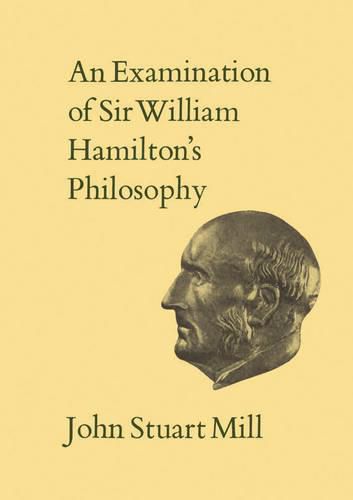Readings Newsletter
Become a Readings Member to make your shopping experience even easier.
Sign in or sign up for free!
You’re not far away from qualifying for FREE standard shipping within Australia
You’ve qualified for FREE standard shipping within Australia
The cart is loading…






Appearing just before his successful parliamentary candidature, the Examination, with its deliberate and explicit onslaught on the intuitionists who were, in Mill’s view, allied with anti-progressive political and religious forces, brought his beliefs into the public arena in a new way. Some of those who supported him politically found themselves viciously attacked because they had associated themselves with one who assailed settled religious beliefs. Other religionists who rejected many of Mill’s attitudes strong expressed their admiration of the Examination because of its exposure to what they, with him, saw as dangerous theological and moral positions. Alan Ryan’s analytical and historial introduction dwells on the most significant philosophical elements in the work, placing them in perspective and showing their relations to other aspects of Mill’s thought. The textual introduction, by John M. Robson, examines the treatise in context of Mill’s life in the 1860s, outlines its composition, and discusses, among other matters, the importance of the extensive revisions Mill made, mostly in response to critics. These revisions appear in full in the textual apparatus. Also provided are a bibliographical index, which gives a guide to the literature on the subject, and a collation of Mill’s quotations, an analytical index, and appendices giving the reading of manuscript fragments and listing textual emendations.
$9.00 standard shipping within Australia
FREE standard shipping within Australia for orders over $100.00
Express & International shipping calculated at checkout
Appearing just before his successful parliamentary candidature, the Examination, with its deliberate and explicit onslaught on the intuitionists who were, in Mill’s view, allied with anti-progressive political and religious forces, brought his beliefs into the public arena in a new way. Some of those who supported him politically found themselves viciously attacked because they had associated themselves with one who assailed settled religious beliefs. Other religionists who rejected many of Mill’s attitudes strong expressed their admiration of the Examination because of its exposure to what they, with him, saw as dangerous theological and moral positions. Alan Ryan’s analytical and historial introduction dwells on the most significant philosophical elements in the work, placing them in perspective and showing their relations to other aspects of Mill’s thought. The textual introduction, by John M. Robson, examines the treatise in context of Mill’s life in the 1860s, outlines its composition, and discusses, among other matters, the importance of the extensive revisions Mill made, mostly in response to critics. These revisions appear in full in the textual apparatus. Also provided are a bibliographical index, which gives a guide to the literature on the subject, and a collation of Mill’s quotations, an analytical index, and appendices giving the reading of manuscript fragments and listing textual emendations.